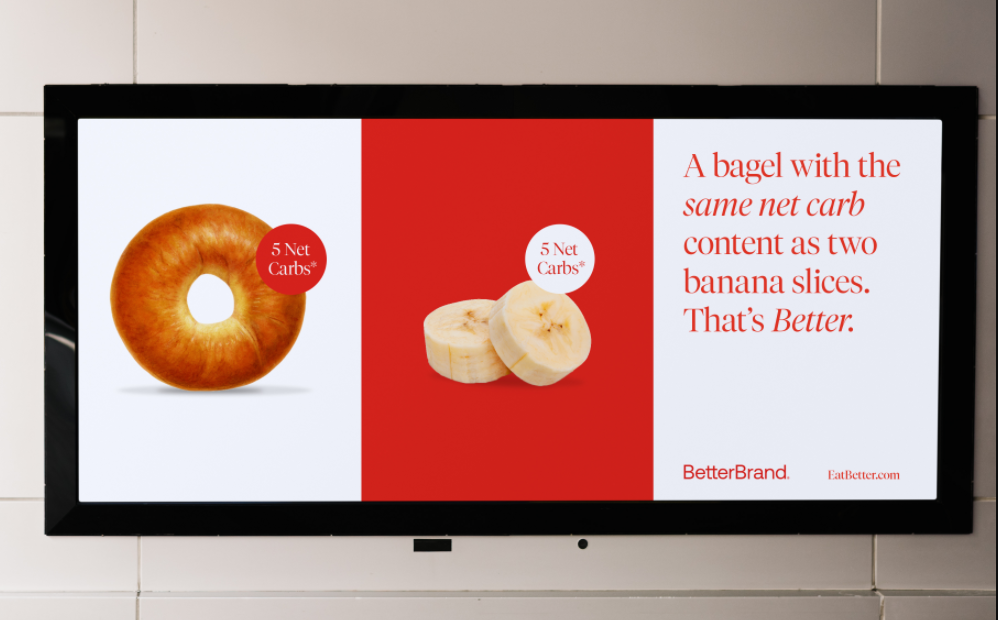The beloved breakfast bagel is the latest food to experience a better-for-you makeover. While it looks and tastes like a normal one, the Better Bagel has the same carbohydrate content as two slices of bananas, the same sugar content as a stalk of celery and the same protein content as four eggs. So, how did Better Brands, the California-based startup behind the Better Bagel, become the “Beyond Meat of carbs?”
Are Traditional Bagels Unhealthy?
According to the US Department of Agriculture (USDA), a bagel made from enriched wheat flour contains 52.4 grams of carbohydrates, 8.43 grams of sugar and 10.6 grams of protein. While the ingredients vary depending on the brand, bagels are traditionally made with flour, wheat, sugar, salt and water, with mass-produced ones containing preservatives, gums and oils.
What sets it apart from a slice of bread or an English muffin is its density. The chewy, satisfying bite generally means it packs more carbs than its breakfast food counterparts, with a carb content equivalent to four standard slices of bread. Not to mention, toppings. It is best to pair them with either fat or protein to slow the digestion of its carbs, but butter and cream cheese tend to reign supreme.
As for its healthfulness, much like any food, it depends on its ingredients, how it’s balanced and how it’s eaten. Since healthy eating isn’t a zero-sum game, bagels can be enjoyed as an occasional splurge. Meanwhile, daily consumers may consider switching to whole wheat, gluten-free or grain-free options. Better Brands, however, believes daily bagel eaters shouldn’t have to compromise on taste or nutrition.
Related: Slate Chocolate Milk: The Better-for-You, Canned Dairy Beverage Designed for Adults
How Are Better Bagels Better?
Mobilizing the power of food tech, Better Brand’s founder and CEO Aimee Yang set out to change the foods we crave the most into foods that are healthful and nutritious — starting with the bagel. While in business school, Yang worked in a food lab to develop a new recipe that could closely mimic a traditional bagel, without the infamously high levels of refined carbs.
Much like Beyond Meat set out to create a more realistic version of beef compared to its veggie patty predecessor, Better Brands wanted to create a better-tasting version of a low-carb bagel. As such, the Better Bagel is made using modified enzyme technology to reduce the net carbohydrates in the grain-based food. Its ingredients include modified wheat starch, wheat protein isolates, potato starch, chicory root fiber, organic brown rice flour, organic white vinegar, yeast, extra virgin olive oil, salt and enzymes.
In terms of nutritional content, one Better Bagel contains 190 calories, 5g of fat, 23g of protein, 1g of sugar and 24g of protein. It also boasts 40mg of calcium, 210mg of potassium and no cholesterol.
The proprietary bagel-making process recently scored the company a $2.5 million investment from venture capital firm Seven Seven Six, bringing the startup’s total funding amount to $3.7 million. Other notable investors include actor Patrick Schwarzenegger and entrepreneur and tech executive Kyle Vogt. The company will allocate the most recent funds towards further research and development, accelerating hiring and preparing for large-scale retail distribution.
While the Better Bagel is still being refined, Better Brands has made it available for purchase through its website for consumer feedback. It can be purchased in packs of four, eight and 12 at $18, $23 and $45, respectively. Where the Better Bagel will fit into the $1 billion US bagel market remains to be seen, but as the first innovation of its kind, it’s bound to find success among bagel lovers.












Join or login to leave a comment
JOIN LOGIN